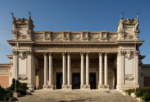Nicola Samorì – Die Verwindung
.jpg)
Il titolo della mostra, Die Verwindung, è preso in prestito da Heidegger e indica un atteggiamento infedele nei confronti della tradizione, ossia un tradimento – che è anche un’abietta transizione – che riprende e al contempo ripensa i tegumenti della pittura.
Comunicato stampa
Sabato 26 gennaio alle ore 18,30 Nicola Samorì inaugura la sua prima mostra personale presso la Galleria Mazzoli di Modena. Il titolo della mostra, Die Verwindung, è preso in prestito da Heidegger e indica un atteggiamento infedele nei confronti della tradizione, ossia un tradimento – che è anche un’abietta transizione – che riprende e al contempo ripensa i tegumenti della pittura. Tale distorsione/dislocazione ha permesso all’artista di investigare e reinterpretare la Storia dell’arte, mettendo in pratica i suoi delitti-diletti ai danni della pittura (disciplina accettata come eredità scomoda ma allo stesso tempo necessaria).
Nel loro farsi e disfarsi, i dipinti assecondano un’intrinseca frantumazione “dell’identità e dell’identico” che intende scandagliare i limiti grammaticali e le possibilità sintattiche di immagini estremamente diffuse. Trafugando le memorie che languono nelle pinacoteche di tutto il mondo, Samorì ha quindi deciso di profanare i capolavori dell’arte, nella speranza di «comprendere la vitalità violata della nostra cultura, un capitale inconscio e materiale». Incoraggiando la forza istintiva e distruttiva dell’organizzazione formale, i quadri di questa mostra infrangono l’armonia delle immagini per svelare e svellere la pittura stessa.
Trasformando i suoi soggetti in molossi (vale a dire: in una materia in via di disgregazione che regge su di sé l’insopportabile gravame del supplizio), l’artista ha finito per castigare ciò che aveva composto, giungendo così all’inevitabile e irrinunciabile assassinio della pittura. Nelle opere realizzate espressamente per gli spazi della galleria, Nicola Samorì ha infatti voluto turbare, deturpare e deformare la pittura, mettendone in evidenza il suo aspetto emofiliaco, di sanguinosa metamorfosi.
Nicola Samorì
Die Verwindung
On Saturday, January 26th at 6.30 pm, Nicola Samorì will open his first solo exhibition at Galleria Mazzoli in Modena. The title of the exhibition Die Verwindung (Overcoming) is taken from Heidegger and suggests a disloyal attitude to tradition, namely, a betrayal – which is also an uneasy transition – that recaptures and at the same time rethinks the integuments of the painting. Such distortion/dislocation has permitted the artist to investigate and reinterpret the history of art, putting his crimes-pleasures of damaging the painting into practice (a discipline that is accepted as an uncomfortable yet, at the same time, necessary legacy).
In their doing and undoing, the paintings indulge an intrinsic shattering “of the identity and of the identical” which aims to comprehend the grammatical limits and the syntactic possibilities of extremely diffuse images. Purloining the memories that languish in galleries all over the world, Samorì thus decided to desecrate the masterpieces of art in the hope of «understanding the violated vitality of our culture, an unconscious and material capital». Encouraging the instinctive and destructive force of formal organization, the pictures in this exhibition shatter the harmony of the images in order to unveil and uproot the painting itself.
Transforming his subjects into a material in the process of disintegration (which carries the unbearable onus of the agony on top of itself), the artist ultimately punishes that which he has created, thus arriving at the inevitable and unrenounceable assassination of the painting. In the works expressly created for the spaces of the gallery, Nicola Samorì actually wanted to upset, disfigure, and deform the painting, demonstrating its haemophiliac aspect, of bloody metamorphosis.
Catalogue:
Nicola Samorì - Die Verwindung
with texts by Franco Rella and Alberto Zanchetta
Galleria Mazzoli Editore
Catalogo disponibile:
Nicola Samorì - Die Verwindung
con testi di Franco Rella e Alberto Zanchetta
Galleria Mazzoli Editore



